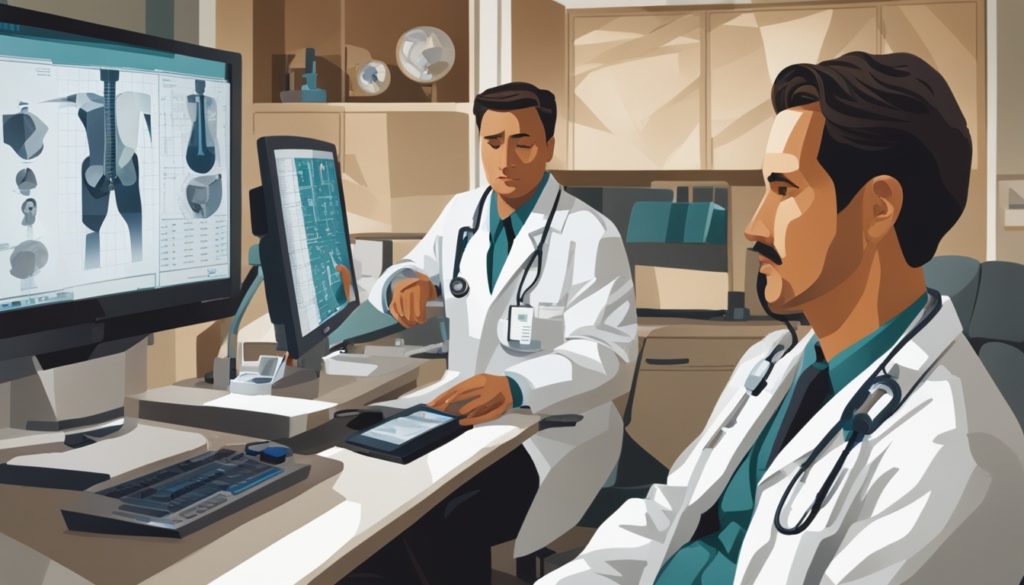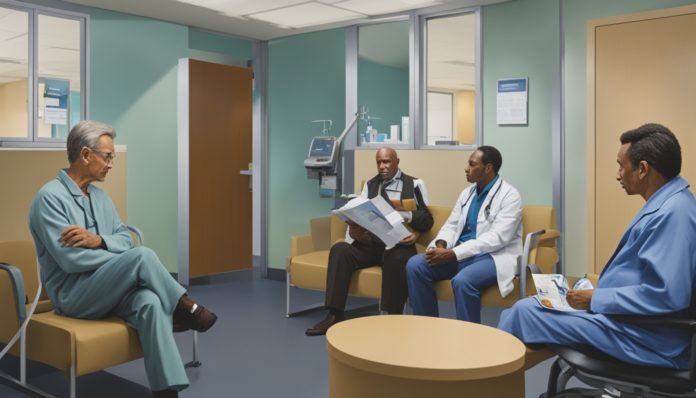Did you know? About 1 in 8 men in the U.S. will get prostate cancer at some point. This makes it a common cancer type among men. It shows how important it is to have good care after finding out you have prostate cancer.
When you get a prostate cancer diagnosis, you might feel overwhelmed. You’ll need to pick the right doctors and places for treatment. You’ll also worry about money and finding emotional support. But, there is help available for prostate cancer patients. Knowing about the support and resources can really help during this tough time.
Starting this new chapter is hard, but you’re not alone. There are many resources and support groups ready to help you. This guide will help you understand the care options and support available. It’s here to make sure you and your loved ones know what to expect and get the support you need.
Key Takeaways
- About 1 in 8 men in the U.S. will face a prostate cancer diagnosis during their lifetime.
- Post-diagnosis prostate cancer care involves choices around healthcare specialists, treatment facilities, and financial planning.
- Comprehensive care for prostate cancer patients includes emotional and psychological support.
- Numerous resources are available to assist patients and families in navigating post-diagnosis challenges.
- Patients are not alone; support systems are designed to ease the journey to recovery.
Understanding Your Prostate Cancer Diagnosis
Getting a prostate cancer diagnosis can feel overwhelming. It’s important to understand your condition well for good prostate cancer management after diagnosis. Knowing about the types and stages of prostate cancer helps you make smart choices about your health care and treatment.

Types of Prostate Cancer
Adenocarcinomas are the most common type of prostate cancer. They start in the gland cells of the prostate. While these are the most common, there are other types that are much rarer:
- Small cell carcinomas
- Neuroendocrine tumors (other than small cell carcinomas)
- Transitional cell carcinomas
- Sarcomas
Knowing the type of prostate cancer you have helps in creating the best prostate cancer treatment plan.
Stages of Prostate Cancer
The spread of cancer determines the prostate cancer stages. Staging helps in prostate cancer management after diagnosis by finding the best treatment. Here are the main stages:
- Stage I: Cancer is only in the prostate and grows slowly.
- Stage II: Cancer is still in the prostate but affects more of it and might spread or grow more.
- Stage III: Cancer has spread to nearby tissues outside the prostate.
- Stage IV: Cancer has moved to lymph nodes or other parts of the body, like the bones.
Knowing your cancer stage is key to picking the right prostate cancer treatment and getting better results.
Selecting the Right Healthcare Team for Treatment
Choosing the right healthcare team is key after a prostate cancer diagnosis. A team with experience can greatly affect treatment success and your health.

Finding a Specialist
It’s vital to find a specialist who knows a lot about prostate cancer. Here’s how to find one:
- Ask your doctor for advice.
- Check out National Cancer Institute-designated centers for their expertise.
- Look at the credentials and experience of specialists for your type of prostate cancer.
This ensures you get the best care tailored to your needs.
Questions to Ask Your Healthcare Team
Talking well with your healthcare team is important for understanding prostate cancer treatment. Ask these key questions:
- What treatment options do I have, and which do you suggest for my case?
- What side effects might I face, and how can we manage them?
- How will treatment affect my daily life, like work and personal activities?
- What are the costs, and are there any help for financial issues?
- How often will I need check-ups, and what will they include?
By asking these questions, you can fully understand your care plan. This helps you make informed choices and manage your health better.
Prostate Cancer Treatment Options
Finding the right prostate cancer treatment is key for good results and outcomes. There are many ways to treat it, each with its own pros and cons. It’s important to know about these options and what they mean.
Surgery
Surgery is often used for prostate cancer that hasn’t spread. The goal is to take out the prostate gland and any nearby tissue that might be cancerous. Patients talk about the different types of surgery, like robotic or open surgery, with their doctors.
Radiation Therapy
Radiation therapy uses high-energy rays to kill cancer cells. It’s a good choice for many stages of prostate cancer. Doctors use methods like external beam radiation or brachytherapy, depending on the patient’s needs.
Hormone Therapy
Hormone therapy lowers or stops the body’s testosterone, which helps cancer cells grow. It’s often used for advanced or spreading cancer, along with other treatments like radiation or surgery.
Clinical Trials
Joining clinical trials for prostate cancer means trying new and innovative treatments. These trials help develop new ways to fight cancer and give patients more options.
| Treatment Option | Benefits | Potential Risks |
|---|---|---|
| Surgery | High success rate for localized cancer, complete removal of identified tumors | Incontinence, erectile dysfunction, surgical risks |
| Radiation Therapy | Non-invasive, effective for various stages, can be combined with other treatments | Fatigue, urinary and bowel issues, skin irritation |
| Hormone Therapy | Slows cancer growth, can shrink tumors, potential to enhance other treatments | Hot flashes, loss of libido, osteoporosis |
| Clinical Trials | Access to new treatments, potential for breakthrough therapies | Uncertain outcomes, possible side effects, limited availability |
Choosing a prostate cancer treatment is a personal decision. It’s important to talk about it with your healthcare team. Knowing about surgery, radiation, hormone therapy, and clinical trials helps patients make choices that fit their health goals and lifestyle.
Costs and Financial Assistance Resources
Getting a prostate cancer diagnosis can be tough on your wallet and your heart. Knowing about financial help can really change things for the better.
There are many groups and programs that offer financial assistance for prostate cancer treatment. They help with surgery, medicine, and other costs. Here are some key resources:
- Non-profit groups like the Prostate Cancer Foundation and CancerCare give grants and support for prostate cancer follow-up care.
- Government programs like Medicaid and Medicare can pay for many prostate cancer treatment costs, making things easier.
- Local hospitals and clinics have financial aid teams to help with discounts or payment plans for treatment costs.
Patients can also look into pharmaceutical programs from companies like Pfizer and AstraZeneca. These programs help lower the cost of medicines, which are key for prostate cancer care.
Finally, working with a financial advisor who knows about medical costs can help you plan better. They make sure you use all the help out there. This way, you can focus on getting better.
Living with Prostate Cancer: Emotional and Psychological Support
Living with prostate cancer means dealing with more than just physical challenges. It’s also about facing emotional and psychological hurdles. Getting emotional support can really help a patient feel better and look on the bright side.
Importance of Emotional Support
Emotional support is key for keeping your mind healthy during treatment. Patients often feel stressed, anxious, and depressed. Having a strong support network is crucial. Family, friends, and loved ones offer great emotional support, making the tough times easier to get through.
Talking regularly and doing things that make you feel good can really help. It can make a big difference in your mental health.
Resources for Counseling and Support Groups
There are many counseling resources for cancer patients to help with the mental side of the disease. You can find professional therapy, mental health counseling, and programs made just for cancer patients. Support groups for prostate cancer are also a great place to be.
These groups let you share your story, connect with others going through the same thing, and get support from them. Online, local hospitals, and cancer centers are good places to look for these resources. Using them can make you stronger emotionally and mentally as you go through prostate cancer treatment.
Managing Treatment Side Effects
Dealing with side effects from prostate cancer treatment is key for patients’ health. These effects can affect reproductive health and make managing incontinence hard after cancer therapy.
Sexual and Reproductive Health
Prostate cancer treatments like surgery and radiation can harm sexual and reproductive health. Patients may face erectile dysfunction or lose fertility. It’s vital to talk about these issues with doctors.
Doctors can suggest therapies and treatments to lessen these effects. This helps patients keep a good quality of life.
For more info, check out this resource. It offers a lot of support.
Bladder and Bowel Issues
Prostate cancer treatment can hurt bladder and bowel function. Managing incontinence after cancer is a big challenge. These problems can really affect daily life, so it’s important to act early.
Special care, like pelvic floor exercises and certain medicines, can help. It’s important to talk to doctors for the right advice and resources.
Early action and ongoing support are key to handling prostate cancer treatment side effects. This helps patients deal with the challenges of life after treatment. It focuses on their overall health and well-being.
Post-Diagnosis Prostate Cancer Care: Follow-Up and Monitoring
After getting diagnosed with prostate cancer, it’s crucial to keep up with regular check-ups and PSA blood tests. These steps are key to catching any changes early. They help in spotting post-treatment issues quickly.
Doctors tailor the follow-up schedule for each patient. It depends on the cancer’s stage and how fast it was caught and treated. Follow-ups often include imaging tests to check for any signs of cancer coming back.
Handling side effects after treatment is a big part of caring for prostate cancer survivors. Patients should talk to their doctors right away if they notice new symptoms. This helps in dealing with problems early and keeping up overall health. Regular PSA blood tests every few months are also important. They give insights and help adjust the care plan if needed.
Here’s a quick look at what follow-up care for prostate cancer includes:
- Regular PSA blood tests to keep an eye on levels.
- Comprehensive check-ups every few months.
- Periodic imaging tests when needed.
- Quick visits to the doctor for any new symptoms.
This detailed approach to care can greatly improve a patient’s life quality. It also helps them feel secure about their health.
Maintaining a Healthy Lifestyle During and After Treatment
Changing your lifestyle during and after prostate cancer treatment can greatly improve your health. It’s key to add more physical activity, eat better, and stop smoking. This approach helps you stay healthy in every way.
Importance of Physical Activity
Regular exercise is good for your overall health and helps you stay healthy after prostate cancer. Studies show that exercise can lower the risk of dying for prostate cancer survivors. Walking, swimming, and lifting weights can boost your heart health, muscle strength, and overall happiness.
Dietary Recommendations
Eating right is crucial for your health after prostate cancer. Eating lots of fruits, veggies, whole grains, and lean meats while cutting down on processed foods is key. This diet can help lower the chance of cancer coming back and improve your survival chances. Here are some tips:
- Increase intake of fresh fruits and vegetables
- Opt for whole grains over refined grains
- Incorporate lean proteins such as fish and poultry
- Limit red and processed meats
- Reduce consumption of sugary drinks and snacks
Quitting Smoking
Stopping smoking is very important for a healthy life after prostate cancer. Quitting can greatly reduce the risk of cancer coming back and other health problems. There are many resources to help you quit, like counseling and nicotine replacement therapy.
Survivorship Care Plan
Creating a detailed prostate cancer survivorship care plan is key for cancer survivors’ ongoing health. It includes a summary of treatments received. This makes it easy for future healthcare providers to see your medical history.
A follow-up schedule is vital for the prostate cancer survivorship care plan. It lists the exams and tests needed to watch for recurrence or new cancers. Regular check-ups help catch problems early, making health management proactive.
The care plan also focuses on preventive steps to lessen health issues from cancer treatments. Staying active, eating well, and making lifestyle changes helps keep you healthy after treatment.
“A survivorship care plan is a living document that evolves with your ongoing health needs. It facilitates seamless communication between your entire healthcare team and new doctors you may encounter along the way.”
Handling health insurance and medical records well is also key. Keeping these documents current and easy to get to helps when you see new healthcare providers. It supports ongoing and proactive health management for cancer survivors.
Conclusion
As we wrap up this guide on prostate cancer care, we see how complex the journey is after diagnosis. Surviving prostate cancer means regular check-ups to watch for any signs of cancer coming back. This careful monitoring helps keep your body healthy and catches health problems early.
It’s also key to have strong emotional and mental support. Dealing with prostate cancer can really affect your mental health. Counseling or joining support groups can be a big help. Having a good circle of family, friends, and experts makes it easier to handle the emotional and mental challenges after cancer.
Living a healthy life is crucial too. This means staying active, eating right, quitting bad habits like smoking, and making plans for your health in the future. Knowing how these choices help your health and make life better is important. For more info on long-term health and survivorship, check out studies on patient-reported outcomes after prostate cancer treatments.
Being proactive and well-informed about prostate cancer survivorship leads to a fulfilling life. By staying alert, connected, and informed, survivors can manage their journey well and live well after diagnosis.
FAQ
What is Post-Diagnosis Prostate Cancer Care?
Post-Diagnosis Prostate Cancer Care is all about helping patients after they find out they have prostate cancer. It covers finding the right treatment, getting emotional support, dealing with side effects, and planning for the future. This ensures patients live well and stay healthy.
What types of doctors should I see after a prostate cancer diagnosis?
Choosing the right healthcare team is key. You’ll need doctors who know how to treat your prostate cancer type. This team might include oncologists, urologists, and radiation experts. They help you pick the best treatment and take care of you.
How do I understand my prostate cancer diagnosis?
It’s important to know the type and stage of your cancer. Most cancers are adenocarcinoma. The stage tells you how big and spread out the cancer is. Talk to your doctor to understand your situation before deciding on treatment.
What are the main treatment options for prostate cancer?
You have three main ways to treat prostate cancer: surgery, radiation, and hormone therapy. Each has its own effects and side effects. You might also have access to new treatments through clinical trials. Talk to your team to find the best option for you.
Can prostate cancer treatment affect my sexual and reproductive health?
Yes, treatments like surgery and radiation can change your sexual and reproductive health. You might have trouble with erections or infertility. It’s important to talk about these risks with your doctor and find ways to help manage them.
How can I manage the costs of my prostate cancer treatment?
Dealing with the cost of treatment can be tough. Look into financial help from national and local groups. Hospitals and cancer support groups can also offer help with costs, including treatment, meds, and co-pays.
Why is emotional support important for prostate cancer patients?
Getting a prostate cancer diagnosis can be very stressful. Emotional support from counseling, groups, and family can make a big difference. It helps you cope better, lowers anxiety, and improves your well-being during treatment.
What is involved in the follow-up and monitoring process after prostate cancer treatment?
After treatment, you’ll need regular check-ups and tests. This includes PSA tests and imaging. Always tell your doctor about any new symptoms or side effects. This helps keep you healthy and catch any problems early.
How can lifestyle changes help during and after prostate cancer treatment?
Living healthier can really help you if you have prostate cancer. Exercise, eating more fruits and veggies, and quitting smoking can boost your health. These changes can also lower your risk of dying from cancer and help you recover better.
What is a survivorship care plan?
A survivorship care plan is a detailed guide for prostate cancer survivors. It outlines your treatment history, follow-up schedule, and ways to prevent other cancers. This plan helps you stay on top of your health and keeps your medical records in order as you move forward.


